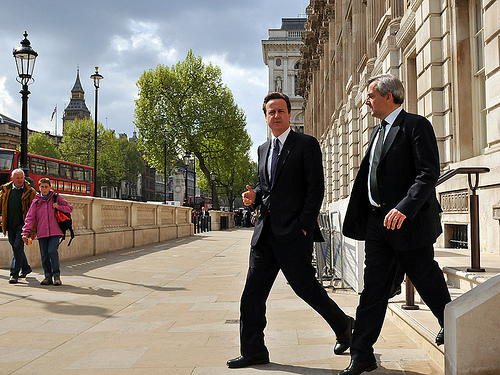Cross-posted from Wind-Works.
Less than two months after Britain’s Labor Party launched its highly regarded feed-in tariff program, the newly elected Conservative government has announced the program will be expanded.
The announcement is included in the coalition government’s agreement published as the new government took office.
Britain’s new government is a coalition of the Conservative Party (the Tories) and the Liberal Democrats. Both parties have issued statements in the past supporting the principle of feed-in tariffs for developing Britain’s renewable energy potential.
The Tories said during the campaign that they would scrap the current Renewable Obligation (RO), the British form of Renewable Portfolio Standards, and use feed-in tariffs to develop renewable energy.
Britain is one of Europe’s renewable energy laggards. Despite the best wind resource in Europe, the county has only developed 4,000 MW of generation after two decades of effort. During the same period, Germany has installed 25,000 MW of wind capacity. France, itself a laggard, has installed as much as Britain in half the time. Both Germany and France use feed-in tariffs.
The British Wind Energy Association objected to the Tory proposal, arguing that abruptly eliminating the RO would cause a hiatus in development, setting renewables back even further.
The coalition agreement should satisfy incumbent wind energy developers and their trade associations as well as new entrants looking to enter the British market.
The agreement implies that the new government will expand the feed-in tariff policy further to encompass more than the “microgenerators” covered under the existing program while maintaining the Renewable Obligation Certificates that are the heart of the RO program. Specifically, the agreement states: “The full establishment of feed-in tariff systems in electricity — as well as the maintenance of banded ROCs”
In another measure of how far the party of Margaret Thatcher has moved toward the rapid development of renewable energy can be found in the Tory manifesto published prior to the election. The manifesto’s section on sustainability singles out Freiburg, Germany, for adulation with a picture of the solar seidlung in the city’s famed Vauban quarter. The solar development in the picture was all driven by Germany’s “banded” system of feed-in tariffs, since emulated in Britain’s new program.
The coalition agreement also stipulates that the two parties will “seek to increase the target for energy from renewable sources” over that of the previous Labor government.
The agreement also has an intriguing passage on nuclear power that may be a harbinger of a change in conservative policies in other English-speaking countries.
“Liberal Democrats have long opposed any new nuclear construction. Conservatives, by contrast, are committed to allowing the replacement of existing nuclear power stations provided they are subject to the normal planning process for major projects (under a new national planning statement) and provided also that they receive no public subsidy.”
Nuclear plants receive various subsidies in both Canada and the U.S., most famously exemption from risk insurance. Further, the Obama administration announced earlier this year a new subsidy program for new nuclear construction in the U.S.
Only time will tell whether the statement was simply rhetorical and the Tories define “subsidies” narrowly enough to permit the government to fund the new reactors proposed by Electricité de France.



